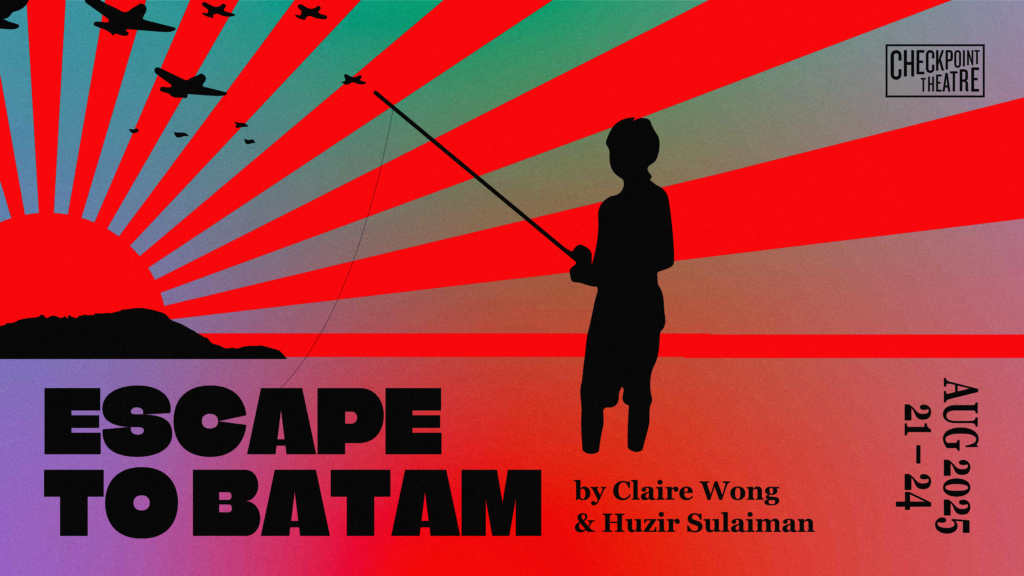
逃离是为了思念—— 观《逃至峇淡岛》
《逃至峇淡岛》(以下简称《逃》)是剧场导演Claire Wong与逝世了的父亲Wong Heck Ming的隔空对话,以舞台为媒介,Claire得以向父亲阐述自己的近况,父亲得以以另一种形式聆听女儿倾述。
凭着父亲从前的手稿,Claire让父亲说话、代父亲说话、为父亲说话。《逃》出现了三个Claire Wong、两个父亲,是相当有趣的处理:谁是Claire Wong?谁是Wong Heck Ming?不同籍贯的演员们演绎同一个角色,是为了体现《逃》是所有新加坡人的故事?台上的Claire有老中青三代,父亲却只有青年时期和老年时期的父亲,是否意味着记忆不可避免的缺陷(还是因为演出经费无法支付多一位演员的费用)?
这样的处理,让观众看到了一个人物的多个面貌,且时间也不再是枷锁,时间是可以被逾越的:两个父亲可以肩搭肩地面对回忆,三个Claire可以互相扶持彼此。
但为什么是不同籍贯的演员们饰演父亲和女儿呢,导演不处理这个疑问,观众只好径自揣想种种诠释与可能性。
Claire对父亲早年生活经历的好奇,让她发现父女俩在不同年代面对的“灾难”:父亲在日据时期不得不逃至峇淡岛、Claire在疫情时期困在岛国逃不出去,两代人处理不同的“灾难”,《逃》却没有提出两代人对“逃难”的意义与反思(例如,戏中提及父亲当年如何为被内部安全法下未被经过审讯拘留的人们争取公平审判的事迹,但这段回忆只是略略带过,可惜至极)。
《逃》为观众细细道来父女间的思念,整部剧缺少戏剧张力,犹如散文,这是创作者的戏剧实验吗?
这是父女间的私密书信,观众不是参与者,而是旁观者,对Claire而言,剧场让记忆得以保存,让失落能被处理,剧场就是Claire Wong的“峇淡岛”,是她随时可安心栖宿的所在。那么,对看戏的我们而言,对所有新加坡人而言,可安心栖宿的所在,又是什么呢。
关于演出:2025年8月24日,3PM,滨海艺术中心新电信水滨剧院,凯门剧场呈现
To Escape is To Remember — Reviewing “Escape to Batam”
“Escape to Batam” (hereafter refer to as “Escape”) serves as a conversation across time, a dialogue between theatre director Claire Wong and her late father, Wong Heck Ming.
With the stage as their medium, Claire finds a way to share her current experiences with her father, while he, in a different form, listens to his daughter’s confidences. Drawing upon her father's old manuscripts, Claire empowered him to speak, sometimes speaking as him, at times speaking for him.
It is interesting to see three Claire Wongs and two fathers re-presented in ‘Escape’, begging questions like ‘Who is Claire Wong?’, ‘Who is Wong Heck Ming?’, ‘Is there a reason for casting actors of different ethnic backgrounds to portray the same character?’, "Was this choice made to suggest that ‘Escape’ is a story of all Singaporeans? ‘, ’While Claire is portrayed in her youth, adulthood, and more mature stage of life, her father is only portrayed in his younger and older years, so does this indicate the inevitable gaps in memory (or was it due to budget constraints that rendered it impossible to afford an additional actor)?", etc.
This directorial approach allowed the audience to witness multiple facets of a single character, so that time ceased to be a shackle, and become something that can be transcended: now the younger and older father can stand shoulder to shoulder; now the three Claires can emotionally support one another.
But why are actors of different ethnicities cast as father and daughter? The director leaves this question unaddressed, leaving the audience to imagine various readings and possibilities.
Claire's curiosity about her father's early life experiences reveals "disasters" that both father and daughter faced in different eras: Her father had to flee to Batam during the Japanese occupation, while Claire found herself confined during the pandemic. Both generations grappled with two different kinds of ‘disasters’, but the play did not explore the significance of ‘escape’, nor reflections on the notion of ‘escaping’ across different generations (for instance, the play briefly mentioned how her father fought for fair trials for those detained without trial under the Internal Security Act, but this memory was only fleetingly mentioned, which is a great pity).
There is a lack of dramatic tension, which made the play felt like more like a prose than a theatre play— was this an experimentation by the creators?
“Escape” is a collection of private writings between father and daughter in which the audience are not participants, but onlookers. For Claire, theatre is a place where memories can be preserved and losses can be processed-- Claire’s version of a "Batam" island, a place where she can always find safe refuge. For all of us watching the play, and for Singaporeans for that matter, what is our safe refuge then?
Performance watched: August 24, 2025, 3PM, at Singtel Waterfront Theatre, Esplanade, presented by Checkpoint Theatre.




Comments
Post a Comment